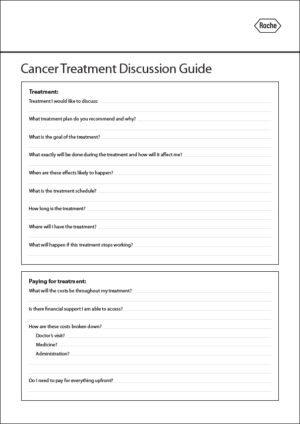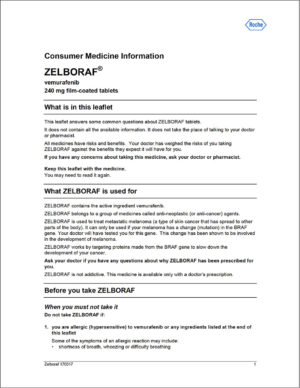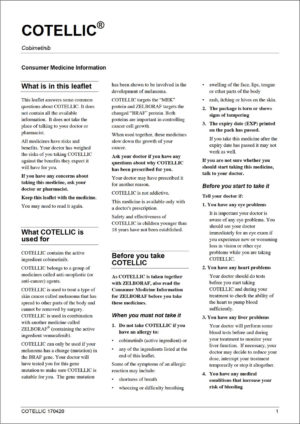Zelboraf® & Cotellic® combination therapy
(vemurafenib) & (cobimetinib)
Pronounced Zel-bor-af & Co-tell-ic
Zelboraf, also known as vemurafenib, is a targeted therapy used to treat a type of skin cancer called melanoma. It is registered by Medsafe for the treatment of adult patients with melanoma which:
- Has spread to other parts of the body (metastatic) or cannot be removed by surgery, and
- Has a certain type of abnormal gene (the BRAF gene).
Cotellic, also known as cobimetinib, is a different type of targeted therapy for the treatment of melanoma, which is used in combination with Zelboraf. The combination of Zelboraf and Cotellic has been shown to work better than Zelboraf alone.
Ask your doctor if Zelboraf and Cotellic are right for you.
How Zelboraf and Cotellic combination treatment works
How Zelboraf works
BRAF is a protein that tells cells when to grow and divide. When it works properly, cells grow and divide at a normal rate.
However, in about 50% of melanoma cases the BRAF protein is faulty. The signals that normally switch the protein off do not work, causing the cells to multiply too quickly and create tumours. It’s like a light circuit in your home that has been built with a faulty switch — no matter how many times you click it up and down, the light remains on.
Zelboraf targets the faulty BRAF protein to help stop the melanoma cells from growing and dividing.


How Cotellic works
The MEK pathway is another mechanism that manages cell production in a healthy body. If it stops working properly cell growth may become uncontrolled, resulting in the development and growth of tumours.
Cotellic is a MEK inhibitor, which means it works by stopping MEK1 and/or MEK2 proteins from overworking. It is not approved to be used on its own — only in combination with Zelboraf.
How Zelboraf and Cotellic combination therapy works
Combination therapy turns off two switches in the circuit and therefore blocks the stimulus that encourages the growth of melanoma.
Possible side effects of Zelboraf and Cotellic combination therapy
All medicines have side effects. You will find a list of known side effects for Zelboraf in the Consumer Medicine Information here. And a list of known side effects for Cotellic in the Consumer Medicine Information here.
Always talk to your doctor if you have any questions or concerns.
Clinical trial data
The efficacy and safety of Zelboraf and Cotellic as treatment for patients with melanoma has been studied in clinical trials.
If you would like to know more about these clinical trials, please talk to your doctor.
Keep in mind that everyone is different, and the response and benefit you may experience cannot be predicted.
Ask your doctor if Zelboraf and Cotellic combination therapy is right for you.
How to access Zelboraf and Cotellic combination therapy
Zelboraf and Cotellic are registered by Medsafe, but not publicly funded by PHARMAC. This means you will have to pay for these medicines. Paying for treatment requires careful thought, but there are financial options that may help you fund private treatment. If you have health insurance, carefully check what’s covered — every health insurance provider has different rules and benefits that cover cancer treatment, surgery, tests and specialist appointments.
Roche also offers support through a Cost Share Programme.
The Zelboraf and Cotellic Cost Share Programme
• Caps the total amount you will pay for your medicine.
• Spreads the costs overtime, so not all of it has to be paid immediately.
• Provides you with ongoing treatment at no cost once you reach the cap (other costs such as doctor fees and dispensing fees will still apply).
If you are considering treatment with Zelboraf and Cotellic combination therapy, ask your doctor about:
• How much will the medicine cost me?
• What benefits might the medicine give me?
• What are the possible risks or side effects?
• Is the Cost Share Programme available to me for this medicine?
Both Zelboraf and Cotellic come in tablet form, so you can take them at home.
All treatments need to be considered in line with your individual situation.
Ask your doctor if Zelboraf and Cotellic combination therapy is the right treatment for you.
Ready to take the next step?
Making decisions about treatment options involves working through the advantages and disadvantages, so you can decide what may work best for you and your loved ones.
Because every situation is different, it’s important to speak to your doctor to find out if Zelboraf and Cotellic combination therapy is right for you.
Talking to your doctor about Zelboraf and Cotellic combination therapy
We’ve put together a discussion guide to help you begin a conversation with your doctor about Zelboraf and Cotellic. Print it off, take it along to your next appointment, and take notes in the spaces provided.
For further information about private treatment providers click here.
You can also talk to your current doctor about referral to a private doctor or treatment centre.
To learn more about how medicines become available in New Zealand, click here.
Handy resources

Discussion guide
DOWNLOAD
Zelboraf Consumer Medicine Information
DOWNLOAD

